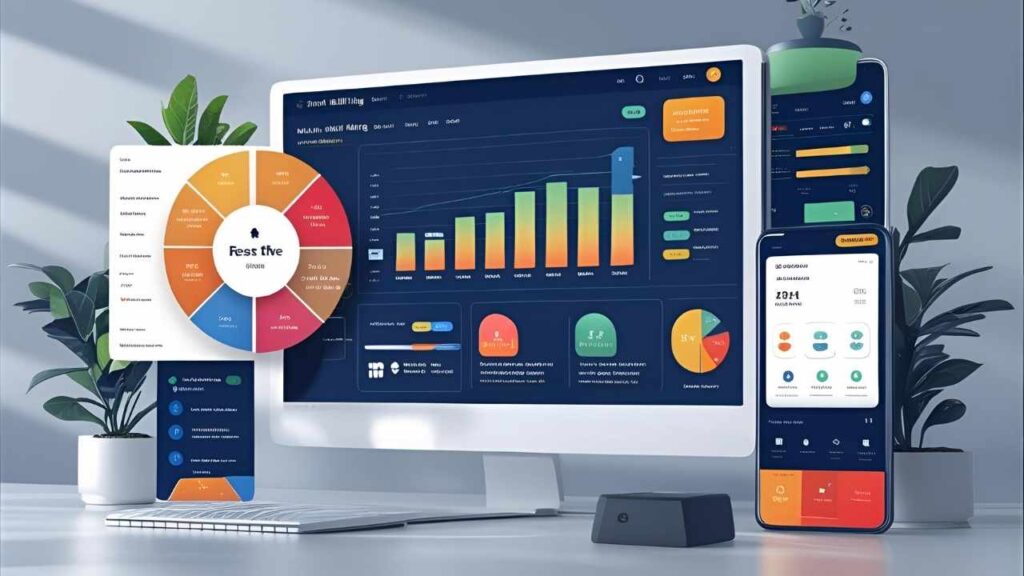Medical billing software is important in the smoothing of the financial and administrative operations of medical practices. They are used to automate billing, processing of claims, coding, and invoices to patients. They minimize manual errors, enhance reimbursements, and assure healthcare compliance with regulations. The following 10 medical billing software systems are based on the requirements of healthcare providers (private practices, clinics, hospitals, and billing service firms).
For larger scale operations, see our list of medical billing software for hospitals. The platforms are particularly useful to medical office managers, health care administrators, and professionals in billing practices who require effective and efficient platforms to manage complicated revenue cycles. The choice of the given medical billing software relied on the following essential characteristics: ease of use, EHR system integration, claim tracking, automation, pricing, customer support, and HIPAA compliance. As the healthcare sector grows more digitized, selecting a proper billing software is the key to enhancing operational efficiency and ensuring financial well-being.
Criteria for Selecting the Best Medical Billing Software in the USA
Here is the list of requirements for the best medical billing software USA
1. Ease of use and user interface
The billing staff, health care providers, and administrators should find it easy to navigate through the software with little training.
2. Claims management capabilities
It must promote the effective submission of claims, real-time verification of eligibility, claim scrubbing, and denial management to minimize errors and delays.
3. Integration with EHR and practice management
An excellent platform will be unified with electronic health records (EHR), scheduling, and patient communication tools.
4. Compliance and security
The system should be HIPAA compliant and should possess features of secure data encryption, controlled access, and audit trail.
5. Customization and scalability
It must have a customizable workflow, templates, and reports, and have the capacity to expand with the practice or specialty.
6. Reporting and analytics
It is also crucial to have powerful reporting tools that will allow tracking of revenue cycle performance, reveal problems, and enhance financial performance.
7. Customer support and training
Consistent customer service and onboarding assistance, as well as training materials, are essential, particularly in the case of smaller or less technology-advanced teams.
8. Pricing model
Know if it is priced on a subscription model, per-user, or percentage-of-collections, and select one that fits your budget and revenue cycle.
9. Specialty support
Ensure that it has software that covers the medical coding, billing procedures, and practices that are unique to your specialty area.
10. Cloud-based access
The advantage of cloud platforms is the possibility of remote access, automatic updates, and higher levels of data security, which makes it a perfect solution in a multi-location or hybrid practice.
List of Top 10 Medical Billing Software
1. Kareo Billing
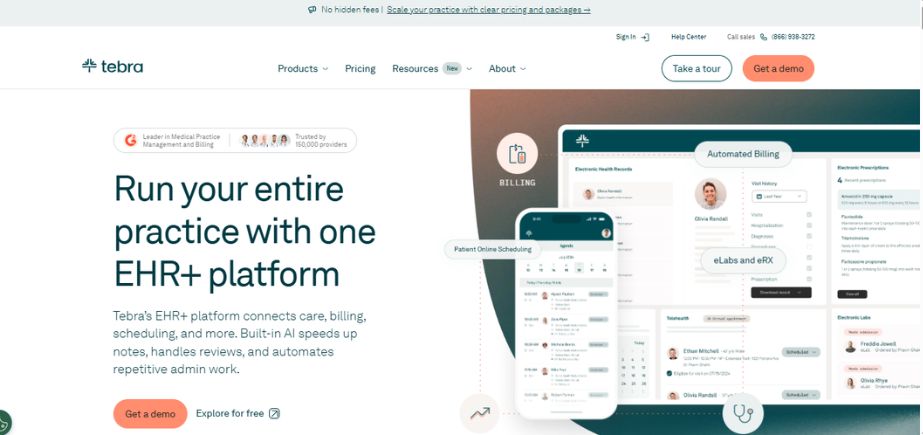
Kareo Billing, now part of Tebra, a cloud-based small-practice medical billing solution is known as Kareo Billing. It also makes revenue cycle management very easy through features such as claims tracking, denial management, custom billing workflow, and integrated scheduling. Kareo is another solution that provides powerful EHR and patient engagement tools and is thus a comprehensive solution for independent practitioners.
It has an intuitive dashboard, which makes it easy to use by non-technical employees, and it has reporting tools to enhance financial visibility. Kareo with its affordability and ease of use is best suited to solo providers or small clinics that only need an all-in-one solution that is not complex and expensive to use like the larger enterprise systems.
Key Features:
- Claims tracking and management
- Integrated electronic health records (EHR)
- Customizable billing workflows
- Appointment scheduling
- Patient portal
Pros:
- User-friendly dashboard
- Great customer support
Cons:
- Limited scalability for larger practices
- Reporting features could be more robust
Pricing:
Custom pricing
Who Should Use It?
Solo practitioners and small medical offices looking for an affordable, all-in-one solution.
2. AdvancedMD
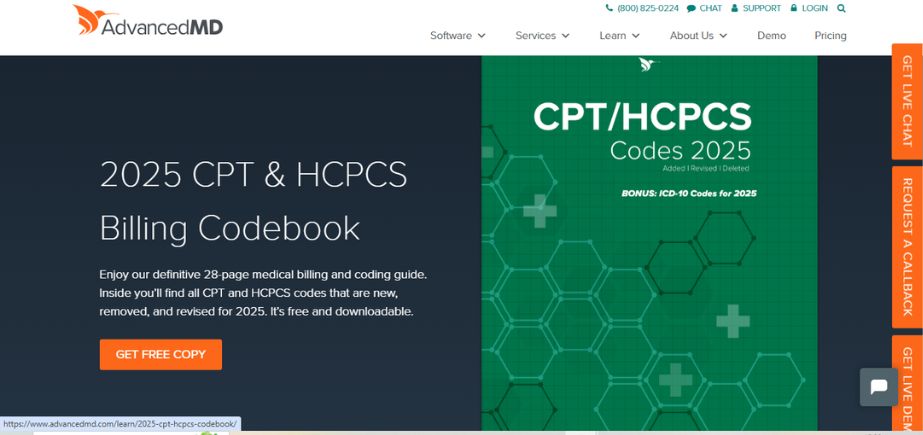
AdvancedMD is a medical billing software that includes billing, scheduling, telemedicine, EHR, and revenue cycle management. It is targeted at medium and large practices and has advanced automation, claim scrubbing, and powerful reporting tools. Its cloud-based system supports multi-location clinics and remote access. It can be customized based on different specialties due to its flexibility in interface and built-in telehealth.
AdvancedMD additionally offers financial and operational performance analytics dashboards. With a greater learning curve and expense, its scalability and extensiveness of features make it appropriate to practices that desire expansion, efficiency, and centralized management.
Key Features:
- Revenue cycle management
- Integrated telehealth
- Automated claim scrubbing
- EHR with customizable templates
- Advanced analytics
Pros:
- Highly customizable
- Great for multi-location practices
Cons:
- Learning curve for new users
- Can be costly for small clinics
Pricing:
Custom pricing based on modules
Who Should Use It?
Medium to large practices needing a robust and flexible platform.
3. AthenaCollector (Athenahealth)
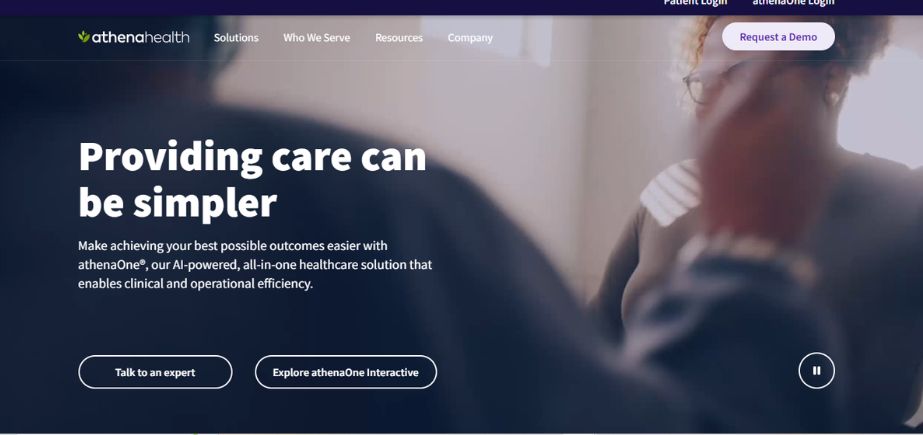
AthenaCollector simplifies medical billing and revenue cycle management through the automation of claims processing, real-time eligibility inquiries, and denial resolution. It can be used together with AthenaClinicals (EHR), which offers a coherent environment for healthcare operations. The platform is continuously updated to match the payer and industry changes to maximize reimbursements.
Because AthenaCollector is priced based on a percentage of collections, it will be attractive to practices seeking performance-based prices. Its interface might be considered old-fashioned by some, but its stability, customer service, and the rate of resolving claims efficiently make it an outstanding choice to those practices, who want to get a billing process hands-off, with the minimum of manual interference.
Key Features:
- Real-time claims edits
- Denial management
- Eligibility verification
- Customizable reporting tools
- Patient payment portal
Pros:
- High claim resolution rate
- Continuous updates and support
Cons:
- Can be expensive
- Interface may feel dated
Pricing:
Upon request
Who Should Use It?
Practices seeking a performance-based billing system with integrated RCM.
4. DrChrono
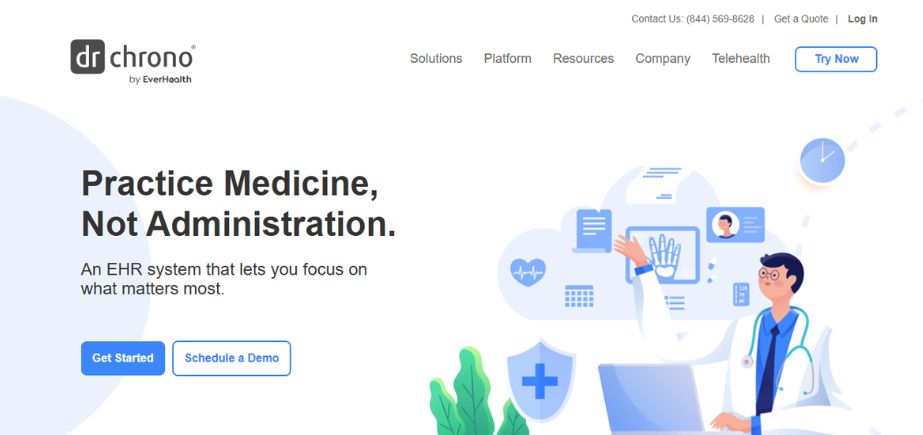
DrChrono is an EHR and billing software designed on the cloud and optimized to be mobile-first healthcare. It is available on iPads and iPhones and facilitates medical billing, scheduling, e-prescriptions, and charting in real time. The billing component of the platform submits claims automatically and includes eligibility verifications, which lighten the administrative burden. It also includes customizable medical forms and lab integration.
Although it is perfectly suited to smaller practices and startups, DrChrono grows with larger teams. With a modern interface and mobility approach, it can stand out among the old-fashioned billing systems, but sophisticated users can be disappointed in its analytics and customization capabilities without paid plans.
Key Features:
- iPad-based EHR
- Medical billing and coding tools
- Claims tracking
- Real-time eligibility checks
- eRx and lab integrations
Pros:
- Great mobility for on-the-go providers
- Intuitive design
Cons:
- Limited customization in lower-tier plans
- Reporting needs improvement
Pricing:
Upon request
Who Should Use It?
Mobile practitioners, small practices, and startups.
5. PracticeSuite

PracticeSuite is a practice management and medical billing software that is cloud-based and best suits growing multi-specialty clinics. It includes scheduling, billing, clearinghouse integration, and patient portal all in an affordable platform. It has features such as real-time insurance eligibility verification, automated patient reminders, and customized financial reports.
Its dashboards are customizable and its architecture is scalable to fit single-provider and group practices. The UI could use an update, but otherwise, the price/reliability/features ratio of this platform is good enough to recommend it to medical offices or billing service providers in need of a comprehensive, yet affordable system.
Key Features:
- EHR and billing integration
- Multi-location support
- Built-in clearinghouse
- Patient reminders and portal
- Role-based access controls
Pros:
- Suitable for growing practices
- Affordable entry-level pricing
Cons:
- Interface can feel outdated
- Occasional system lags
Pricing:
Book a demo
Who Should Use It?
Small to medium multi-specialty practices and billing companies.
6. NextGen Healthcare
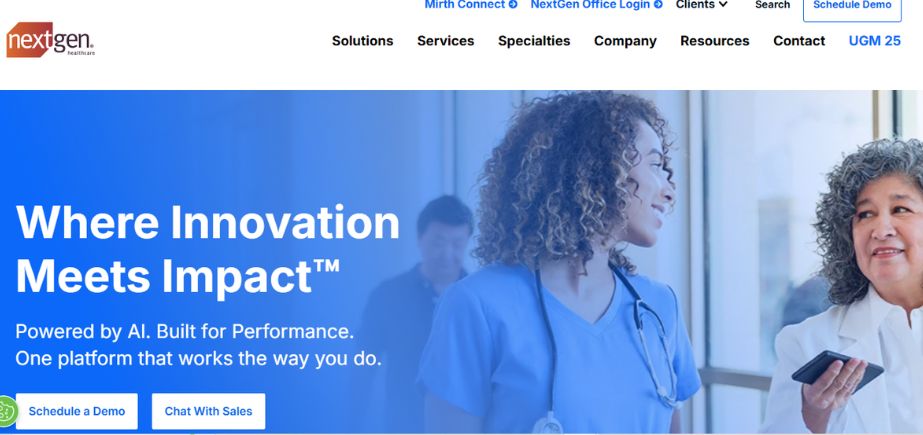
NextGen Healthcare provides enterprise Billing and EHR solutions to large practices, specialty providers, and health systems. The software is associated with profound functionality and can handle the entire revenue cycle management, patient experience improvement, templating, and analytics. It offers powerful compliance, reporting, and workflow automation tools.
Onboarding and implementation take time and training, but the long-term outcomes are higher efficiency of operations and patient outcomes. NextGen with its custom pricing and rich functionality is well suited to high-volume clinics or institutions requiring powerful reporting, scaling, and interoperability between departments.
Key Features:
- RCM with automated workflows
- Integrated analytics and KPIs
- Patient experience platform
- Interoperability support
- Customizable EHR
Pros:
- Strong for regulatory compliance
- Rich in features and scalability
Cons:
- Not beginner-friendly
- Setup takes time
Pricing:
Custom pricing based on modules and practice size
Who Should Use It?
Large practices, healthcare systems, and specialty providers needing robust tools.
7. CareCloud
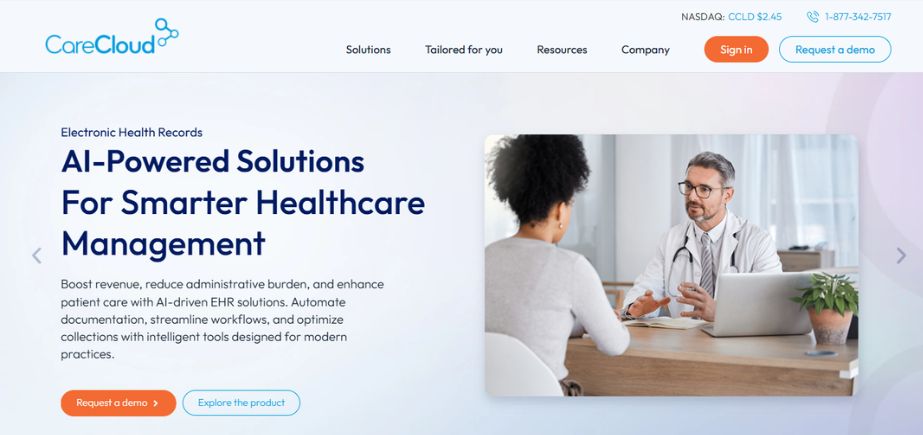
CareCloud is a contemporary, cloud-based system that comprises practice management tools, revenue cycle management tools, and EHR. It also has a user-friendly interface, advanced analytics, and real-time dashboards to assist providers in monitoring financial and clinical performance. CareCloud is a solution created to serve the needs of growing medical groups and specialty-specific practices, patient engagement, and telehealth.
Its design and in-built tools enhance the user experience both for the providers and the administrators. Although it is more expensive than a few of its rivals, the graphical appeal, excellent support, and rich features of CareCloud make it a perfect fit for multi-provider practices that are interested in updating their operations and billing processes.
Key Features:
- Revenue cycle and billing tools
- Cloud-based practice management
- Real-time analytics dashboard
- Telehealth and patient engagement
- EHR integration
Pros:
- Sleek and modern UI
- Responsive customer service
Cons:
- Can be expensive for small practices
- Occasional integration issues
Pricing:
Custom pricing
Who Should Use It?
Expanding medical groups looking for a stylish, all-in-one cloud platform.
8. EZClaim
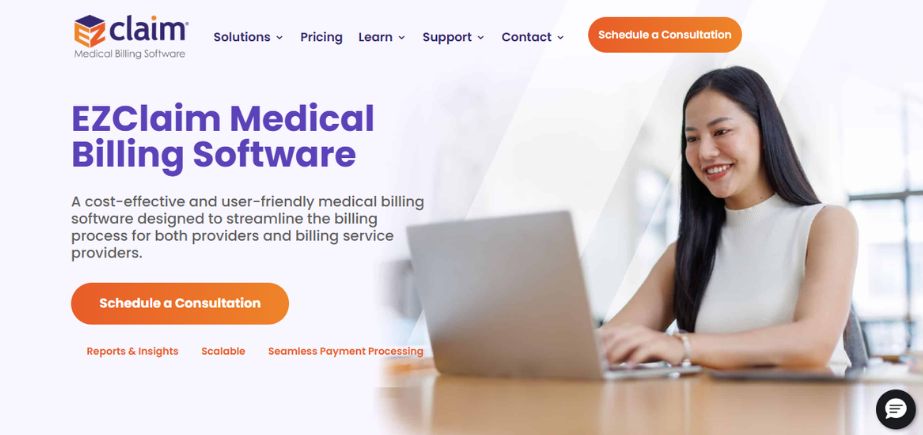
EZClaim is a low-cost and highly flexible medical billing software, which is available on desktop and cloud. It features claims processing, claims scheduling, custom reports, and connectivity with well-known clearinghouses. It is targeted at solo practitioners and small billing companies and is easy to use and fast to install. EZClaim might not have all the bells and whistles of the higher-priced platforms, but it is very simple and affordable.
The desktop version is specifically helpful to users who have less access to the internet. The interface could use a bit of modernizing, but overall performance stability and a low learning curve are its strong points, which budget-conscious providers should take an interest in.
Key Features:
- Claims processing and tracking
- Scheduling module
- Custom forms and reports
- EHR integrations
- Clearinghouse compatibility
Pros:
- Budget-friendly
- Easy to install and use
Cons:
- Dated interface
- Limited scalability
Pricing:
Starts at $169/month
Who Should Use It?
Small billing companies and solo providers needing an economical solution.
9. Medical Office Online
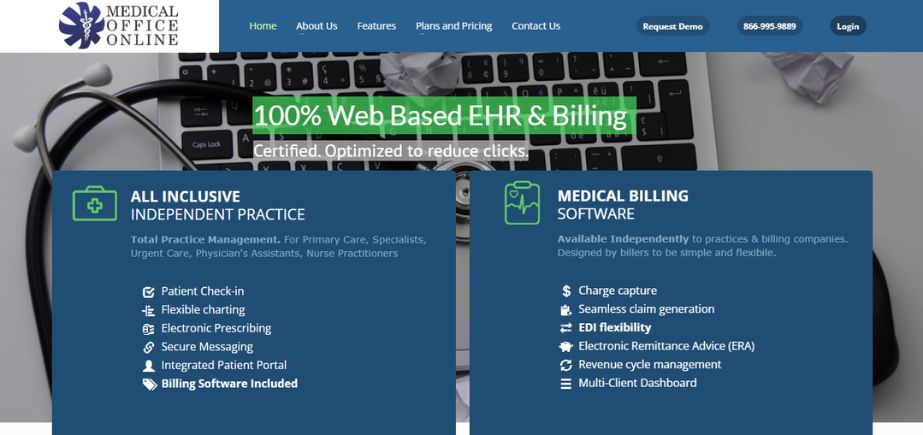
Medical Office Online is a web-based, inexpensive system, which offers EHR, billing, scheduling, and patient communication. It has a minimalistic design and orientation on key functions such as electronic claims submission, eligibility checks, secure messaging, and e-prescribing. This would especially make it viable for small practices that have less staff or technology infrastructure.
It does not have a modern design and expanded functionality of premium platforms, but it is excellent value for money. It is simple to navigate, and it would benefit the independent providers that Seek an all-in-one, cost-effective software with reliable basic functions and a hassle-free implementation process.
Key Features:
- Web-based billing
- Real-time eligibility checks
- Integrated scheduling
- Secure patient messaging
- E-prescribing
Pros:
- Easy to implement
- Very affordable
Cons:
- Basic interface
- Fewer updates compared to larger platforms
Pricing:
Starts at $99/month
Who Should Use It?
Independent practices and small clinics with limited budgets.
10. CharmHealth
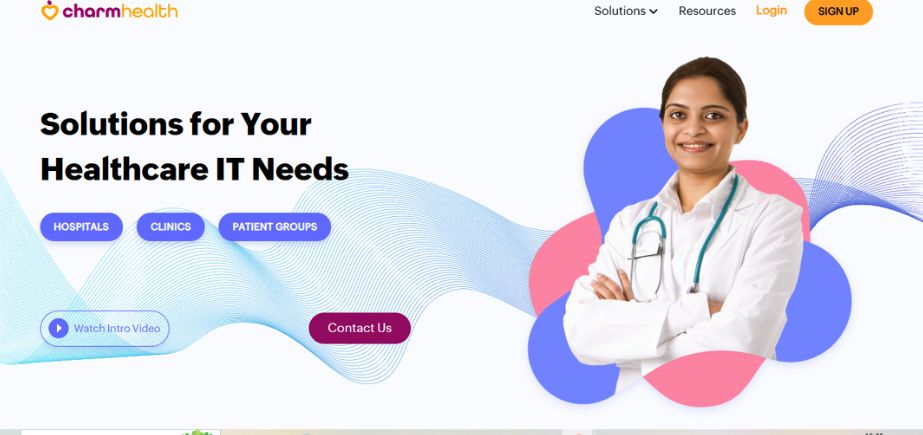
CharmHealth is a cloud-based medical billing software that combines usability, scalability, and affordability, making it a favorite among small to medium-sized practices. It offers a robust suite that includes billing, EHR, and practice management tools within a HIPAA-compliant platform. CharmHealth simplifies claims processing with automated workflows, supports e-prescriptions, and offers real-time claim tracking.
Its user-friendly interface and customization options are designed for independent clinics seeking efficiency without a steep learning curve. While its features are abundant, some users find its third-party billing integrations slightly limited. CharmHealth’s pricing is competitive, and its modular approach allows practices to pick only what they need.
Key Features:
- Real-time claim tracking
- Integrated EHR and practice management
- Customizable billing workflows
- Telehealth and patient portal
- ICD-10 & CPT coding support
Pros:
- User-friendly and intuitive interface
- Affordable with scalable modules
Cons:
- Some limitations in third-party integrations
- May not suit enterprise-scale operations
Pricing:
Custom pricing
Who Should Use It?
Small to mid-sized practices and independent providers looking for a customizable, all-in-one billing and EHR platform.
Comparison Between the Best Medical Billing Software
Here’s a comparison table of the 10 popular medical billing software in the USA, including key features, pricing, ideal use cases, and official websites:
| Software | Key Features | Pricing (Approx.) | Ideal Use Case | Website |
| Kareo Billing | Claims management, EHR integration, patient portal, scheduling, analytics | Custom pricing | Small practices needing simple, integrated billing | tebra.com/ |
| AdvancedMD | RCM, EHR, telemedicine, reporting, mobile access | Upon request | Medium to large practices with multiple providers | www.advancedmd.com |
| AthenaCollector | Real-time claim edits, denial mgmt, eligibility checks, reporting | upon request | Practices preferring % fee model with high efficiency | www.athenahealth.com |
| DrChrono | Mobile EHR, medical billing, claim tracking, eRx, scheduling | Upon request | Mobile-first practices and startups | www.drchrono.com |
| PracticeSuite | Multi-specialty billing, scheduling, patient portal, clearinghouse | Book a demo | Growing clinics and billing service providers | www.practicesuite.com |
| NextGen Healthcare | RCM, analytics, EHR, compliance tools, patient experience | Custom pricing | Enterprise-level or specialty care organizations | www.nextgen.com |
| CareCloud | RCM, practice mgmt, EHR, analytics, telehealth | Custom pricing | Mid-sized to large multi-provider groups | www.carecloud.com |
| EZClaim | Desktop/cloud billing, claims tracking, scheduling, custom forms | Starts at $169/month | Solo practitioners and billing services | www.ezclaim.com |
| Medical Office Online | Web-based billing, eRx, secure messaging, scheduling, eligibility checks | Starts at $99/month | Budget-sensitive solo or micro practices | www.medicalofficeonline.com |
| CharmHealth | Cloud billing, quick claims, reminders, clearinghouse, EHR add-on | Custom pricing | Small practices needing fast reimbursement cycles | www.charmhealth.com/ |
Conclusion
The choice of the appropriate medical billing software varies on the specialty and size of your healthcare practice. athenaCollector and Kareo are excellent, scaleable options for large organizations and hospitals that require more extensive automation and integrations. DrChrono and AdvancedMD could be the right fit for small to mid-sized practices due to their user-friendliness and ability to be customized.
WebPT is highly specialized to the needs of rehabilitation and therapy-centered clinics, whereas CureMD is an ideal option when the practice is in search of cloud-based performance. CollaborateMD and NueMD offer good features at low prices making them suitable for budget-conscious providers. The platforms cover different needs, such as claim management, compliance, etc., so it is necessary to align your particular operational objectives with the strengths of the software to achieve better reimbursement, fewer errors, and an improved administrative workflow.
FAQs
1. What is medical billing software?
Medical billing software assists medical practitioners to handle patient billing, claiming, insurance verifications, and collections. It also automates administration to guarantee quicker reimbursements and reduce mistakes.
2. Who is the medical billing software user?
Hospitals, clinics, private practices, medical billing firms, and solo practitioners use it to streamline revenue cycle management.
3. Is HIPAA-compliant medical billing software?
Yes, the majority of the reliable medical billing software utilized is HIPAA compliant to guarantee the safe management of patient information.
4. Does it interfere with Electronic Health Records (EHR)?
Yes, a good number of medical billing applications are coming with EHR/EMR systems to allow the free flow of data between the billing and patient records.
5. Which features are to be sought?
Select claim tracking, insurance eligibility verification, reporting, billing codes that can be customized, and payment processing.
6. Is on-premise cloud-based billing software superior?
Automatic updates, remote access, scalability, and cheaper initial costs are some reasons why cloud-based software is normally desired.

